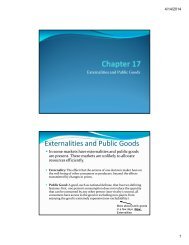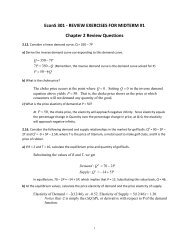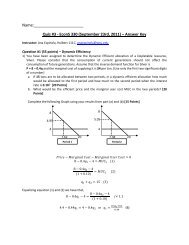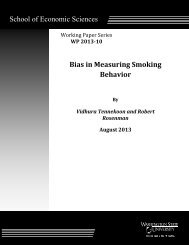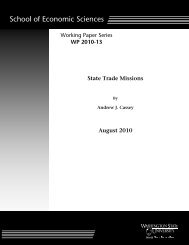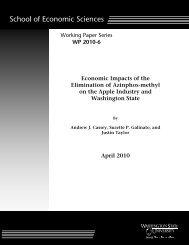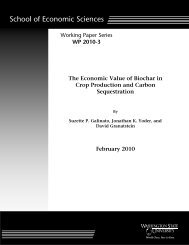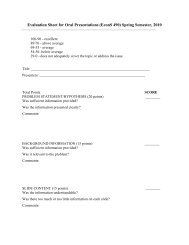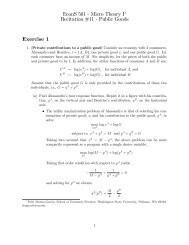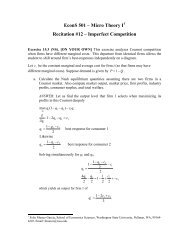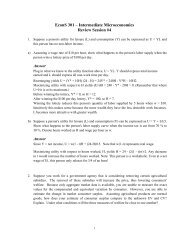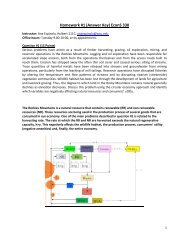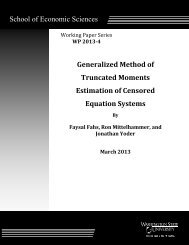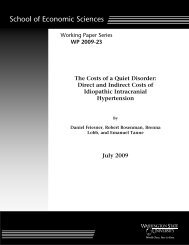Estimation of Educational Borrowing Constraints Using Returns to ...
Estimation of Educational Borrowing Constraints Using Returns to ...
Estimation of Educational Borrowing Constraints Using Returns to ...
- No tags were found...
You also want an ePaper? Increase the reach of your titles
YUMPU automatically turns print PDFs into web optimized ePapers that Google loves.
educational borrowing constraints 155<br />
reject the hypothesis that OLS estimates and instrumental variable estimates<br />
are the same.<br />
Columns 4–6 exhibit estimates <strong>of</strong> the same specifications except that<br />
test scores and family income are excluded. The OLS and instrumental<br />
variable point estimates <strong>of</strong> the schooling coefficient are both higher,<br />
but the instrumental variable estimate remains larger than its OLS counterpart.<br />
Other specifications not reported here, including a more standard<br />
one with AFQT score instead <strong>of</strong> the set <strong>of</strong> four test scores, all yield<br />
similar patterns. These results are also similar <strong>to</strong> those <strong>of</strong> Arkes (1998),<br />
who uses state unemployment rates in a similar design and finds instrumental<br />
variable estimates higher than OLS estimates.<br />
A potential problem with this specification is that it does not account<br />
for influences <strong>of</strong> economic downturns on schooling choices that operate<br />
through family income or through the decision <strong>to</strong> work while in college.<br />
<strong>Borrowing</strong>-constrained families may find raising funds for college more<br />
difficult during recessions. This possibility can reverse the direction <strong>of</strong><br />
labor market effects: schooling may increase during booms for children<br />
whose parents are borrowing-constrained. Thus the influence <strong>of</strong> local<br />
labor market conditions on schooling attendance is no longer mono<strong>to</strong>nic.<br />
Intuitively, the income and substitution effects <strong>of</strong> changes in local<br />
labor market conditions go in opposite directions for borrowing-constrained<br />
families, and it is not clear which effect dominates. However,<br />
if families are not borrowing-constrained, there is no income effect on<br />
schooling (as in a standard human capital model). Thus it is possible<br />
that borrowing-constrained families send their children <strong>to</strong> college at<br />
higher rates during a boom, whereas non-borrowing-constrained families<br />
send their children at higher rates during a bust when forgone<br />
earnings are low.<br />
The negative association between county earnings and schooling reported<br />
in table 2 supports the dominance <strong>of</strong> forgone earnings on schooling<br />
decisions. However, this makes the instrumental variable results in<br />
table 3 even more surprising. If children <strong>of</strong> borrowing-constrained families<br />
have higher marginal returns <strong>to</strong> schooling and decrease schooling<br />
during recessions, the discount rate bias should be negative. Our empirical<br />
findings are counterintuitive if credit constraints are important.<br />
The mechanics <strong>of</strong> this argument are formalized in section A <strong>of</strong> our<br />
technical appendix (available at http://www.econ.northwestern.edu/<br />
faculty/taber).<br />
The case in which students work while in school is analogous. Students<br />
who are borrowing-constrained would presumably be more likely <strong>to</strong> work<br />
in college. Thus the effect <strong>of</strong> local labor market conditions would likely<br />
have a larger effect on individuals who are not borrowing-constrained<br />
since they depend less on opportunities <strong>to</strong> work during college in order



